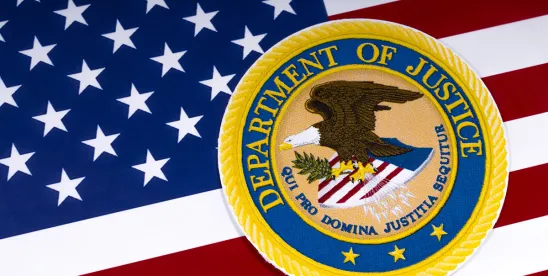The U.S. Department of Justice (DOJ) announced its declination to prosecute private equity firm White Deer Management and its affiliates after the firm voluntarily self-disclosed criminal sanctions and export-control violations committed by Unicat Catalyst Technologies — an acquired company.
The decision — issued by the DOJ’s National Security Division (NSD) and U.S. Attorney’s Office for the Southern District of Texas — marks the first public application of the NSD’s Merger & Acquisition Safe Harbor Policy following a voluntary self-disclosure by an acquiring company. This significant statement comes at a critical time with the DOJ actively shifting resources to focus on customs evasion, while also providing concrete assertions that self-disclosure will yield material benefits to reporting entities.
Private equity firms should take note of the DOJ leadership’s commitment to offering meaningful value in exchange for voluntary self-disclosure and its strategic advantages during this moment in the history of the DOJ.
Background: Uncovering Hidden Misconduct
Unicat, a Texas petrochemical company, supplies chemical catalysts and related services essential in oil refining and steel production. Unicat operated a global sales force based in Texas to sell and distribute catalysts worldwide.
Prior to White Deer’s acquisition, a few key executives, including CEO Mani Erfan, controlled Unicat’s corporate culture. Erfan held primary responsibility for the company’s sales activities and legal compliance program. Unicat primarily sourced its materials from Chinese manufacturers in China through one of the company’s co-founders, who operated a branch office in China and acted as the company’s buying agent.
From 2014 to 2021, Erfan instructed subordinate employees to carry out 23 sales transactions of catalysts to customers in Iran, Venezuela, and Cuba — jurisdictions subject to U.S. sanctions that prohibit such transactions. Many of Unicat’s customers in Iran were petrochemical refineries, petrochemical companies and steel plants owned by the Iranian government.
Erfan used logistics managers, sales agents, and technical advisors to assist in preparation, bidding and fulfillment of the illegal transactions. He also ordered employees to falsify business records and coordinate shipments from the company’s operations in China to the customers in the sanctioned jurisdictions. Finally, Erfan instructed Unicat employees to fabricate invoices to reduce tariffs on catalyst that the company imported from China.
White Deer acquired Unicat in 2020, along with another related company in the United Kingdom. Before the transactions closed, White Deer retained outside counsel to perform pre-closing due diligence but did not discover these violations at that time.
Rather, the violations came to light shortly after the transactions closed, when White Deer started consolidating the operations of Unicat and the U.K. company. During that time, Erfan was removed as CEO of Unicat and the new CEO was informed of a pending catalyst sale to an Iranian customer.
The new CEO immediately ordered the cancellation of that sale and alerted the White Deer board, who retained new counsel to investigate. Before the investigation was completed, White Deer submitted a voluntary self-disclosure to the DOJ’s NSD.
The investigation ultimately revealed that the illegal sales to sanctioned jurisdictions had resulted in approximately $3.3 million in revenue for the company. Additionally, it found that Unicat had avoided paying the U.S. government more than $1.6 million in tariffs due to its falsified documents.
The DOJ revised its NSD Enforcement Policy for Business Organizations in March 2024 to incorporate a safe harbor for acquirers who satisfy the following criteria:
- The acquisition must be a lawful, bona fide transaction — a deal negotiated at arm’s length with business justification — resulting in actual change in control.
- The self-disclosure must be timely, which generally will be satisfied if the disclosure happens within 180 days of the date that the transaction is completed.
- The acquiring company fully complies with NSD’s investigation and it timely and appropriately remediates the conduct.
Because of its well-timed and comprehensive self-disclosure, the DOJ granted White Deer a full declination under the NSD policy. Unicat, for its part, entered into a non-prosecution agreement, forfeiting approximately $3.3 million in illicit proceeds. It also agreed to pay nearly $3.9 million in civil penalties to the Office of Foreign Assets Control (OFAC) of the U.S. Department of the Treasury and the U.S. Department of Commerce Bureau of Industry and Security (BIS), plus approximately $1.65 million to U.S. Customs and Border Protection (CBP) for customs underpayment. Erfan also pleaded guilty to conspiracy, unlawful export, concealment, and money laundering, and agreed to pay a $1.6 million money judgment.
Key Trends and Indicators at the DOJ
As the first public declination under the NSD’s Merger & Acquisition Safe Harbor Policy, the White Deer/Unicat case reinforces the DOJ’s commitment to rewarding responsible corporate behavior — even in matters implicating national security and export sanctions — where the cooperating entity demonstrates prompt and meaningful efforts to bring unlawful action to the government’s attention and works to facilitate the DOJ’s investigation.
Matthew Galeotti, the head of the DOJ’s Criminal Division, recently highlighted that commitment in public remarks. During his speech, Galeotti emphasized that the “benefits to companies that voluntarily self-report, cooperate, and remediate have never been clearer and more certain” than they are today. In the past, self-reporting entities only received a presumption in exchange for their cooperation, but the DOJ now makes it clear that deserving entities “will receive a declination” for their self-disclosure.
At the same time, the DOJ has demonstrated a keen interest in investigating customs fraud and tariff evasion. Bloomberg Law recently reported that DOJ has reallocated resources in its Market Integrity and Major Frauds Unit (MIMF) to focus on going after tariff evasion schemes, including unlawful rerouting of goods, misclassification, and undervaluing imports.
Whistleblower tips are anticipated to be instrumental in supporting the MIMF’s enforcement initiatives in this area, especially given the challenges associated with detecting unlawful schemes.
In the current compliance environment, private equity firms may consider voluntary self-disclosures during post-acquisition due diligence, as it can increase potential incentives:
- Risk Reduction: Prompt self-reporting may lead to declination, including in situations that involve significant misconduct.
- Financial Clarity: Self-disclosure may prevent drawn-out litigation and larger penalties.
- Reputational Benefit: Recognition by the DOJ for cooperation can strengthen a company’s reputation with key stakeholders.
- Policy Assurance: This decision signals policy consistency, rewarding firms that maintain strong compliance.
- Flexibility Threshold: The DOJ allows reasonable delays for real-world issues, giving companies time to respond appropriately.
To ensure prompt and effective action, private equity sponsors should have vigorous post-closing diligence protocols to identify problematic transactions as soon as they become apparent. Companies should also train their employees on common “red flags” in export controls, sanctions, and national security compliance areas and have protocols in place to investigate suspected violations immediately, including engaging counsel as quickly as possible.
Conclusion
The DOJ’s decision to decline prosecution of White Deer under its recently adopted M&A Safe Harbor policy is a significant milestone. In today’s enforcement climate, private equity firms should view voluntary disclosure not as a last resort, but as a strategic tool to manage transactional risk, reinforce compliance culture, and preserve both reputation and shareholder value. This decision is a clear signal that now is the optimal time for proactive self-disclosure.





 />i
/>i
